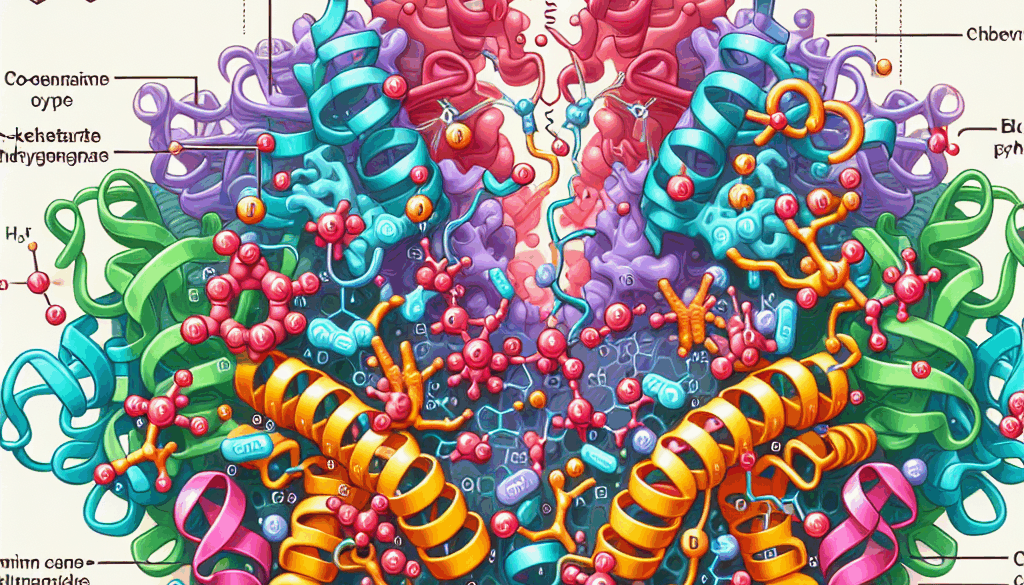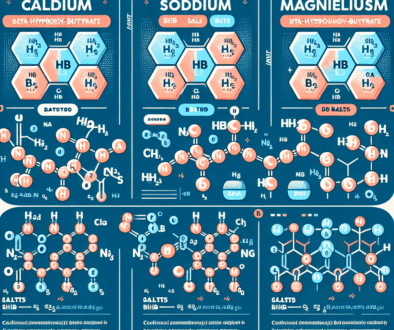α-Ketoglutarate Dehydrogenase Complex and Its Significance
-
Table of Contents
- α-Ketoglutarate Dehydrogenase Complex: Unveiling Its Crucial Role in Cellular Metabolism
- Understanding the α-Ketoglutarate Dehydrogenase Complex
- Significance of α-KGDH in Metabolic Pathways
- Implications of α-KGDH Dysfunction
- Therapeutic Potential and Research Directions
- Conclusion
- Explore ETprotein’s High-Quality Protein Products
α-Ketoglutarate Dehydrogenase Complex: Unveiling Its Crucial Role in Cellular Metabolism
The α-Ketoglutarate Dehydrogenase Complex (α-KGDH) is a pivotal enzyme complex in the citric acid cycle, or Krebs cycle, which is fundamental to cellular energy production. This complex catalyzes the conversion of α-ketoglutarate into succinyl-CoA, a critical step in the metabolic pathway that fuels cellular respiration. Understanding the function, regulation, and implications of α-KGDH malfunction offers valuable insights into metabolic diseases and potential therapeutic targets.
Understanding the α-Ketoglutarate Dehydrogenase Complex
The α-Ketoglutarate Dehydrogenase Complex is a key enzyme system in the mitochondria, playing a vital role in the aerobic respiration process. It consists of multiple subunits and requires several cofactors, including thiamine pyrophosphate (TPP), lipoic acid, NAD+, and FAD, to function effectively.
- Structure: α-KGDH is a multienzyme complex composed of three main components: E1 (α-ketoglutarate dehydrogenase), E2 (dihydrolipoamide succinyltransferase), and E3 (dihydrolipoamide dehydrogenase).
- Function: It catalyzes the decarboxylation of α-ketoglutarate to form succinyl-CoA, an essential intermediate that enters the citric acid cycle.
- Regulation: The activity of α-KGDH is tightly regulated by substrate availability and feedback inhibition by its product, succinyl-CoA, and by the energy status of the cell, indicated by ATP and NADH levels.
Significance of α-KGDH in Metabolic Pathways
The α-Ketoglutarate Dehydrogenase Complex is not only crucial for energy production but also plays a significant role in several other metabolic pathways:
- Amino Acid Metabolism: α-KGDH is involved in the metabolism of glutamate and other amino acids, linking nitrogen metabolism with energy production.
- Redox Homeostasis: By influencing NADH levels, α-KGDH affects the redox state of the cell, which is crucial for the balance of oxidation-reduction reactions.
- Signal Transduction: Succinyl-CoA, the product of the α-KGDH reaction, serves as a signaling molecule, modulating the activity of various cellular processes.
Implications of α-KGDH Dysfunction
Dysfunction or deficiency of the α-Ketoglutarate Dehydrogenase Complex has been linked to several diseases and pathological conditions:
- Neurodegenerative Diseases: Impaired function of α-KGDH is associated with neurodegenerative diseases such as Alzheimer’s and Parkinson’s disease. The enzyme’s dysfunction leads to decreased energy production in neurons and increased oxidative stress.
- Cancer: Some cancer cells exhibit altered α-KGDH activity, which affects their metabolic pathway known as the Warburg effect, leading to enhanced glycolysis and rapid cell growth.
- Metabolic Disorders: Abnormalities in α-KGDH activity can also contribute to metabolic disorders, impacting overall energy metabolism and leading to symptoms such as fatigue and muscle weakness.
Therapeutic Potential and Research Directions
Given its central role in metabolism and disease, α-KGDH is a potential target for therapeutic intervention. Researchers are exploring several approaches to modulate its activity:
- Enzyme Activators: Compounds that enhance α-KGDH activity could boost energy production, especially beneficial in neurodegenerative diseases where mitochondrial dysfunction is prevalent.
- Enzyme Inhibitors: Inhibiting α-KGDH could be a strategy to starve cancer cells by cutting off their energy supply and inhibiting growth.
- Genetic Therapies: Gene therapy approaches to correct or modulate the expression of genes encoding the α-KGDH complex could address the root causes of metabolic and degenerative diseases.
Conclusion
The α-Ketoglutarate Dehydrogenase Complex is a cornerstone of cellular metabolism, influencing not only energy production but also amino acid metabolism, redox balance, and cellular signaling. Its dysfunction is implicated in a range of diseases, highlighting its potential as a target for therapeutic strategies. Ongoing research into the regulation and modulation of α-KGDH holds promise for the development of treatments for metabolic and degenerative diseases, offering hope for interventions that could enhance quality of life and longevity.
Explore ETprotein’s High-Quality Protein Products
If you are looking for premium protein products that support health and wellness, consider ETprotein. They offer a wide range of high-quality, organic bulk vegan proteins and elite nutritional ingredients. Their products are ideal for various applications, including sports nutrition, dietary supplements, and more. For more information or to sample their products, please contact sales(at)ETprotein.com.
ETprotein is α-Ketoglutarate Factory Manufacturer and Supplier in China, Check further information by visiting the α-Ketoglutarate Product Page
Request Quotation and Samples of α-Ketoglutarate from ETprotein
About ETprotein
ETprotein, a reputable protein and elite nutrition ingredients α-Ketoglutarate Chinese factory manufacturer and supplier, is renowned for producing, stocking, exporting, and delivering the highest quality organic bulk vegan proteins and elite nutritional ingredients α-Ketoglutarate. They include Organic rice protein, clear rice protein, pea protein, clear pea protein, watermelon seed protein, pumpkin seed protein, sunflower seed protein, mung bean protein, peanut protein. Their offerings, characterized by a neutral taste, non-GMO, allergen-free attributes, cater to a diverse range of industries. They serve nutraceutical, pharmaceutical, cosmeceutical, veterinary, as well as food and beverage finished product distributors, traders, and manufacturers across Europe, USA, Canada, Australia, Thailand, Japan, Korea, Brazil, and Chile, among others.
ETprotein specialization includes exporting and delivering tailor-made protein powder and finished nutritional supplements. Their extensive product range covers sectors like Food and Beverage, Sports Nutrition, Weight Management, Dietary Supplements, Health and Wellness Products, and Infant Formula, ensuring comprehensive solutions to meet all your protein needs.
As a trusted company by leading global food and beverage brands and Fortune 500 companies, ETprotein reinforces China’s reputation in the global arena. For more information or to sample their products, please contact them and email sales(at)ETprotein.com today.












